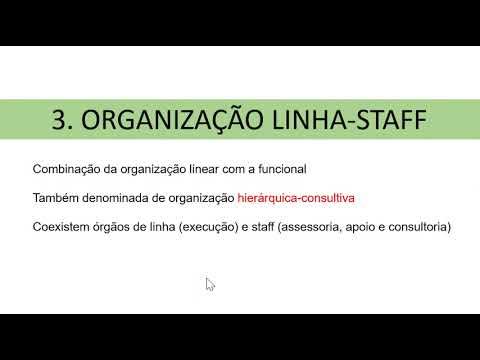Apa Itu Struktur Organisasi?
Summary
TLDRThis video explores the fundamentals of organizational structure, emphasizing its role in clarifying roles, responsibilities, and authority within an organization. Key concepts include work specialization, departmentalization, the chain of command, span of control, and the balance between centralization and decentralization. It highlights how effective structuring can enhance efficiency, communication, and decision-making processes while addressing potential pitfalls like bureaucracy that may stifle creativity. Ultimately, understanding these elements is crucial for managing organizations effectively and achieving collective goals.
Takeaways
- 😀 An organization consists of a group of people working towards a common goal.
- 📊 Organizational structure defines how tasks are divided, grouped, and coordinated.
- 🔍 Work specialization increases efficiency by allowing individuals to focus on specific tasks.
- 🏢 Departmentalization can be based on function, product, geography, or customer type.
- 📈 The chain of command clarifies reporting relationships and authority within an organization.
- 🔄 Span of control refers to the number of employees a manager can effectively supervise.
- ⚖️ Centralization concentrates decision-making authority at the top, while decentralization distributes it across various levels.
- 📋 Formalization establishes how much documentation and rules govern employee behavior.
- 🚀 Specialization can lead to increased efficiency, improved skills, and reduced idle time.
- ⚠️ Bureaucratic structures can enhance efficiency but may hinder creativity and employee motivation.
Q & A
What is the primary definition of an organization?
-An organization is defined as a group of individuals who share common goals and objectives, requiring at least two people to exist.
Why is organizational structure important?
-Organizational structure is crucial because it delineates roles, responsibilities, and relationships among members, ensuring effective coordination and operational efficiency.
What does work specialization refer to?
-Work specialization, or division of labor, refers to breaking down tasks into smaller parts that are assigned to individuals, leading to increased efficiency and expertise.
What are the common bases for departmentalization?
-Common bases for departmentalization include function, product, geography, and customer type.
What is the significance of the chain of command?
-The chain of command establishes a clear hierarchy in an organization, defining who reports to whom, which enhances accountability and authority.
How does span of control affect management?
-Span of control refers to the number of subordinates a manager can effectively supervise. A wider span allows for quicker communication and decision-making, while a narrower span can complicate the communication process.
What distinguishes centralization from decentralization?
-Centralization concentrates decision-making authority at the top of the organization, while decentralization distributes authority among various levels for faster and more localized decision-making.
What is formalization in the context of organizational structure?
-Formalization is the extent to which policies, procedures, and rules govern employee behavior. High formalization results in rigid structures, while low formalization allows for more flexibility.
What key questions should be considered when designing an organizational structure?
-Key questions include how to subdivide tasks (work specialization), how to group tasks (departmentalization), who reports to whom (chain of command), how many people a manager can supervise (span of control), where decision-making authority should reside (centralization vs. decentralization), and to what extent rules should govern behavior (formalization).
What are the potential drawbacks of a bureaucratic organizational structure?
-While bureaucratic structures provide clarity and efficiency, they can lead to rigidity, a lack of creativity, and employees feeling disengaged from problem-solving, as they may defer decisions to higher authorities.
Outlines

This section is available to paid users only. Please upgrade to access this part.
Upgrade NowMindmap

This section is available to paid users only. Please upgrade to access this part.
Upgrade NowKeywords

This section is available to paid users only. Please upgrade to access this part.
Upgrade NowHighlights

This section is available to paid users only. Please upgrade to access this part.
Upgrade NowTranscripts

This section is available to paid users only. Please upgrade to access this part.
Upgrade NowBrowse More Related Video

PENGERTIAN, PRINSIP DAN STRUKTUR ORGANISASI

PERTEMUAN 7 - PENGORGANISASIAN / ORGANIZING (PENGANTAR MANAJEMEN)

Analisis Jabatan Online Lecturing_Wewenang dan Tanggung Jawab

Aula 3.2c Estrutura Organizacional Linha Staff

Topik 01 Manajemen | Konsep Dasar Manajemen: Organisasi dan Manajemen

Organizational Structure | PMP | Edureka
5.0 / 5 (0 votes)